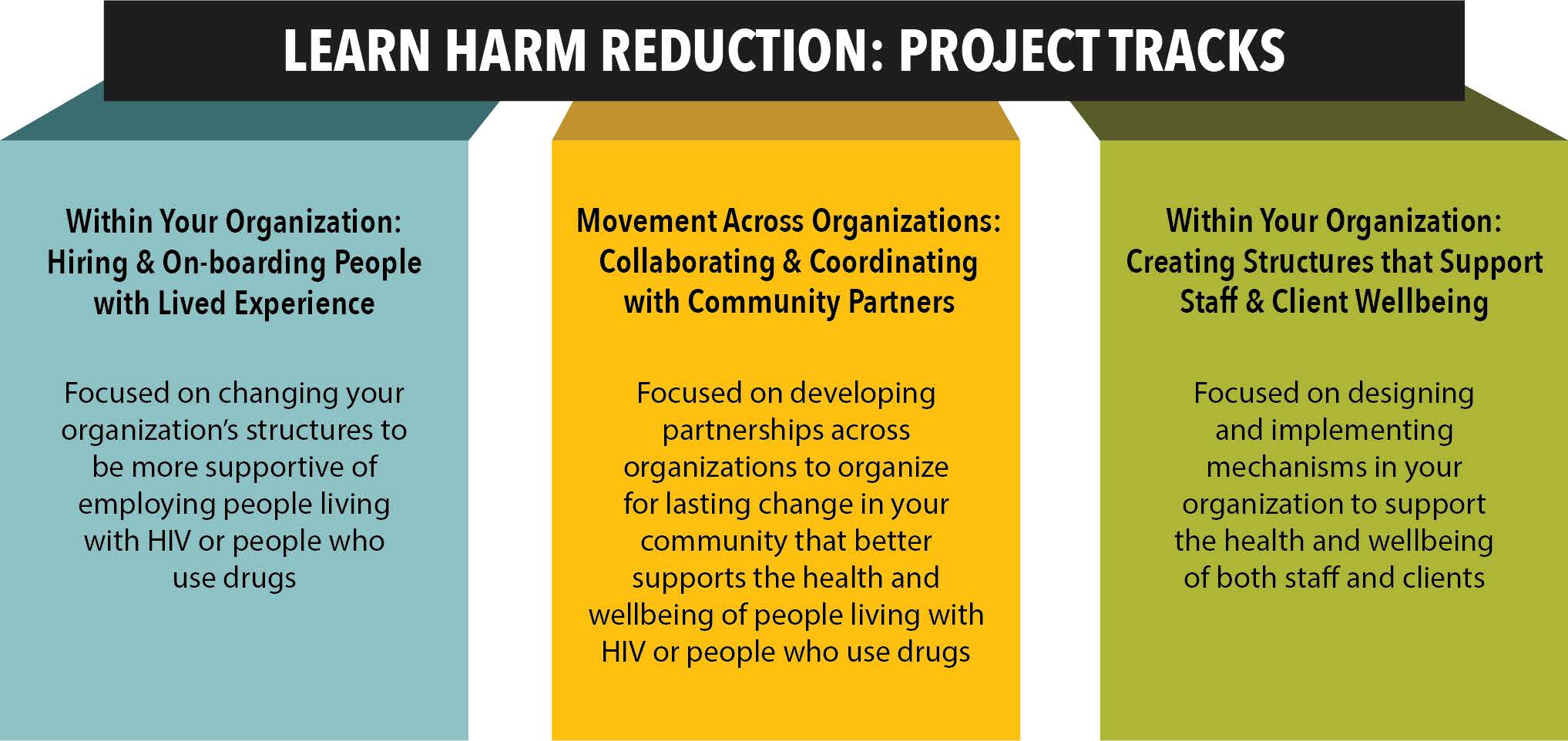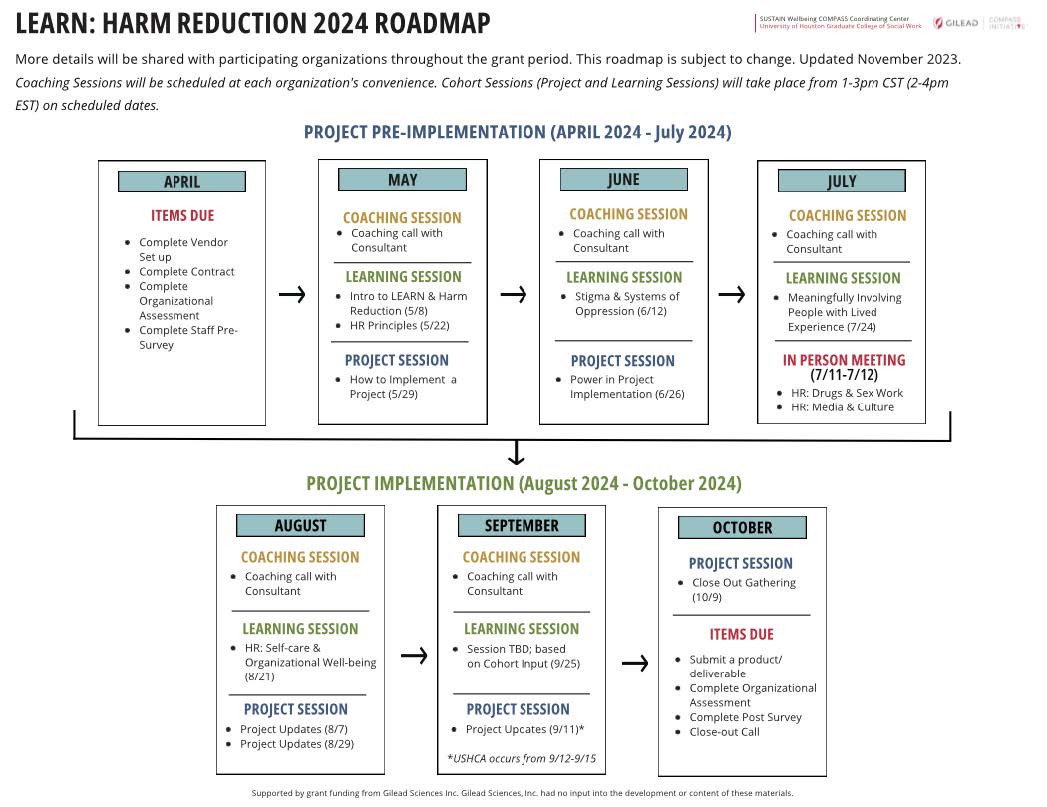Login to Complete an Application or to Access Judging Panel
COMPASS Initiative® Leading through Education, Advocacy & Resistance with our Neighbors Harm Reduction ( LEARN HR)
Application Spring 2024
LEARN HR
February 2, 2024 - March 13, 2024
LAND ACKNOWLEDGEMENT
We wish to recognize the land, stewarded by people of the Coahuiltecan, Karankawa and Ishak (Atakapa) Tribal Nations, upon which the SUSTAIN Center occupies. Our intention is to honor the Indigenous people by knowing the land on which SUSTAIN operates. We are actively learning and reaching out to know how to show up in solidarity and be in meaningful relationships with the people and the land. In addition, we recognize the harms experienced by Indigenous people as a result of settler-colonial institutions and practices. While in the process of learning, we are committed to providing organizational funding and capacity building in support of the health and wellness goals determined by the philosophies, customs, traditions, and people of the Tribal Nations.
Program Description
Leading with Education, Advocacy & Resistance with our Neighbors (LEARN) is SUSTAIN Wellbeing COMPASS Coordinating Center’s shared learning opportunities to build organizational leadership and support organizational transformation. The primary goal of LEARN is to build knowledge, capacity, expertise and leadership in a particular topic area. A second important goal of LEARN is to strengthen community networks through enhanced collaboration between participating organizations. Each cohort of LEARN is centered on a different content area.
SUSTAIN is excited to announce the launch of our sixth cohort of LEARN Harm Reduction (HR), which will be co-facilitated by SUSTAIN Program Coordinator Katie McCormick and community-based expert consultant Sandra Chavez! Sandra is the Director of Social Wellness at Austin Sexual Health and Wellness (ASHwell) and has 15+ years of experience working at the intersections of HIV, housing, and harm reduction in the Southern U.S. Katie and Sandra are thrilled to facilitate another cohort of LEARN HR! No prior knowledge around harm reduction is required to participate.
LEARN HR consists of virtual group and coaching sessions over the course of 7 months. Four to six organizations will be selected for each cohort. Organizations should also be prepared to design and complete a new project or activity centered around harm reduction within the 7 months of LEARN HR. Organizations can expect to contribute up to 6-8 hours a month to LEARN HR meetings and activities. Organizations will receive a $13,000 stipend to support costs related to project implementation and participants’ travel to the in-person gathering. No prior knowledge around harm reduction is required to participate in LEARN HR.
About Harm Reduction
Harm reduction is defined as both a movement for social justice, as well as policies, practices, and programs that center the rights and autonomy of people who use drugs. Additionally, harm reduction recognizes the role of structural oppression and social inequities that impact individuals, and aims to reduce the negative consequences associated with drug use at the individual, community, and systemic levels. Harm reduction is person-centered and not a one-size-fits-all model, thus there is no prescribed way of practicing harm reduction. Instead, harm reduction is guided by a set of eight core principles which are made available by the National Harm Reduction Coalition. Though harm reduction emerged from the context of injection drug use in the 1980’s, harm reduction has been implemented across a range of settings (e.g., interventions that promote strategies to reduce potential risks for people who exchange money, drugs, or goods for sex; programs that reduce tobacco use). A central goal of LEARN HR is to educate and equip leadership and providers in HIV service organizations throughout the South with the knowledge and skills needed to implement harm reduction in their organizations.
After LEARN HR, participants will be able to:
● Recognize the realities of structural oppression (ex: racism, poverty, past trauma) and other social inequalities that affect people’s vulnerability and capacity for dealing with harm.
● Practice non-judgmental, non-coercive service provision with communities they serve.
● Apply new harm reduction knowledge by creating and implementing a harm reduction-centered project.
About LEARN
LEARN HR has 3 different but intersecting components: 1)Meetings, 2)Project Implementation, and 3) Evaluation and Reporting.
1. Meetings
LEARN HR consists of the following over the course of 7 months:
- Bi-weekly (2 times a month) virtual cohort sessions
- Monthly one-on-one virtual coaching sessions
- An in-person gathering (1.5 day in-depth training and working session in July)
Four to six organizations will be selected for each cohort. Organizations can expect to contribute up to 6-8 hours a month to LEARN HR meetings & activities.
2. Project Implementation
Organizations should be prepared to initiate and complete a project centered around harm reduction that they would like to address in a collaborative, shared learning environment. Organizations will receive a $13,000 stipend to support costs related to implementing their project and participants’ travel to the in-person gathering.
Project Tracks
- Because LEARN is centered around transforming organizational practice, projects should focus on organizational change. All organizations are expected to collaborate with people living with HIV and/or people who use drugs in the design, implementation, and evaluation phases of their project.
- Organizations should choose one of the following project tracks: 1) Hiring and onboarding people with lived experience, 2) Collaborating and coordinating with community partners, and 3) Creating structures that support staff and client wellbeing. See the figure below for a brief description of each track.
- Organizations do not need to have a project plan at the application stage; selected organizations will design and implement their project with the support of the cohort and coach. Selected organizations will design their project plan in the first 1-2 months (May & June) of LEARN HR, and implement their projects in the remaining 3-6 months (July-September)

3. Evaluation and Reporting
Selected organizations should expect to participate in evaluation activities. This includes four surveys at the beginning and end of LEARN HR (May & October), as well as a virtual Close Out Call at the end of LEARN HR (October). Additionally, selected organizations should expect to complete Quarterly Reports throughout LEARN HR (June, September, & December).
Eligibility
Organizations interested in participating in LEARN HR must have a primary organizational purpose of serving people living with HIV. Organizations that demonstrate a commitment to cultivating the leadership of Trans, Women, Latinx, Black, Immigrant and Lesbian, Gay and Bisexual communities will be prioritized, along with those who serve rural communities and communities most impacted by the HIV epidemic (see Ending the HIV Epidemic jurisdictions). Organizations of all sizes are encouraged to apply, but for those that have more than 30-40 staff members, please specify your application to a particular department of your organization. No prior knowledge around harm reduction is required to participate.
Organizations eligible to participate in LEARN HR must:
- Aim to increase engagement of people who receive services (e.g., people who use drugs, people living with HIV) in a more meaningful way;
- Have a primary organizational purpose of reducing new HIV infections and/or improving the health of people living with HIV by utilizing a harm reduction approach;
- Have an idea for a project centered around harm reduction that they would like to work on throughout LEARN HR;
- Be a non-profit, tax-exempt organization as set forth in section 501(c)(3) of the Internal Revenue Code. Applicants that do not hold 501(c)(3) status must have a fiscal sponsor to apply;
- Be located in one of the twelve Southern states (AL, AR, FL, GA, KY, LA, MS, NC, OK, SC, TN, TX);
- Identify and commit 2 people within the organization (1 decision-maker and 1 program staff) that agree to participate fully in all LEARN HR meetings/activities; and
- Agree to work with our evaluation partners, if funded, to help measure the impact of the program.
Funding
Organizations will receive a $13,000 stipend to support costs related to implementing their harm reduction project and participants’ travel to the in-person gathering.
Unallowable Expenses
It is appropriate to use LEARN HR funds to pay for things like materials, meeting expenses, printing, graphic design services, etc. However, there are prohibited expenses. You cannot use the funds to pay for or offset the cost of any of the following:
- Medications or purchasing of medications
- Direct medical expenses, including lab expenses
- Existing deficits of organization
- Biomedical research or clinical trials
- Projects that directly influence or advance Gilead Science’s business, including purchase, utilization, prescribing, formulary position, pricing, reimbursement, referral, recommendation or payment for products
- Individuals, individual health care providers, or physician group practices
- Events or programs that have already occurred
- Government lobbying activities
Please Note: Reimbursement for items/services purchased or initiated prior to the submission of this funding request will not be supported. Organizations that do not complete final assessments and/or reports, or utilize funds for the intended purpose will not be eligible to receive any additional funding from the SUSTAIN Wellbeing COMPASS Coordinating Center.
Accessibility Statement
Guided by our COMPASS values, we strive to be accessible and accommodating to the communities we work with. Accessibility is our priority and we are committed to better practices that would support your application process. If you would like another option to apply, please email our Program Coordinator, Katie McCormick (she/her), at kamccor5@central.uh.edu by Wednesday, March 13, 2024 at 11:59pm EST (10:59pm CST). Requests after March 13th, 2024 will not be considered.

LOGISTICAL DETAILS
LEARN Harm Reduction consists of multiple sessions over 6 months in 2024 with all participating organizations. Specific details of each component are listed below:
- Virtual Cohort Session Dates: Cohort sessions will take place for 2 hours twice a month (Wednesdays from 1-3pm CST/2-4pm EST) beginning in May through October on the following dates:
- May 8, May 22, & May 29
- June 12 & June 26
- July 24
- August 7, August 21 & August 28
- September 25
- October 9
- Coaching Session Dates: Each organization selected to participate will receive individualized coaching from LEARN facilitators over the course of 6 months (one hour-long session per month, 6 sessions total). These will be scheduled according to the availability of both the organization and facilitators.
- In-Person Convening Date and Location:
- The cohort will gather for an in-person meeting on July 10-12th in Houston, Texas. Both LEARN HR project staff members are expected to attend. Selected organizations may use a portion of their LEARN HR grant (up to $3,000) to pay for travel expenses (e.g., flight, hotel). Additional details will be announced to the cohort of selected organizations in May/June.
Application Deadline: March 13th, 2024 at 11:59pm EST (10:59 CST)
How to Apply
Please return to the Home Page to apply for this funding.
View the PDF version of the application HERE.